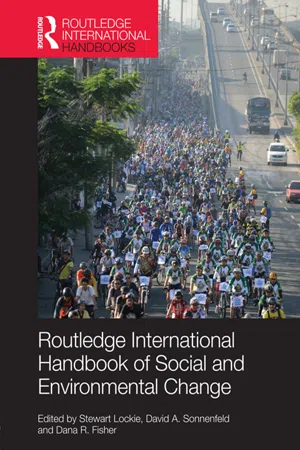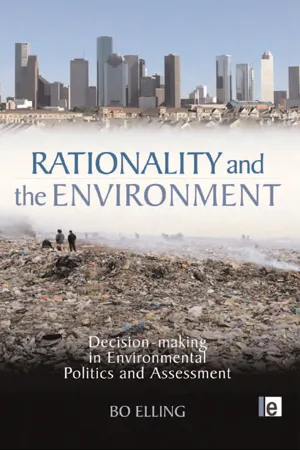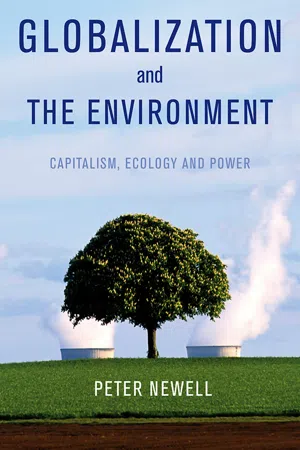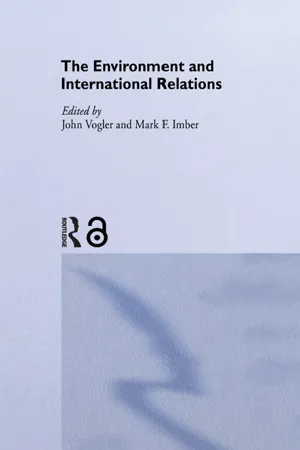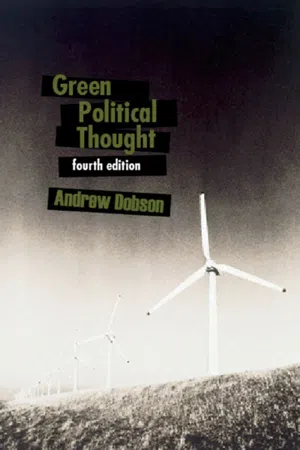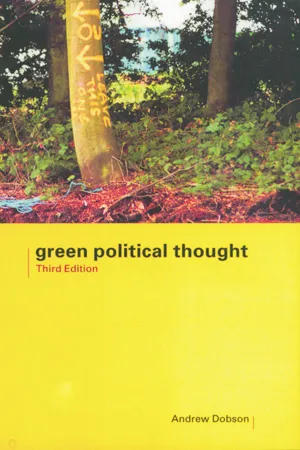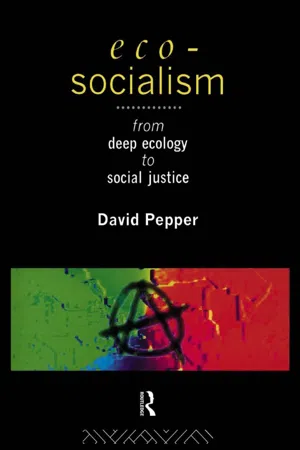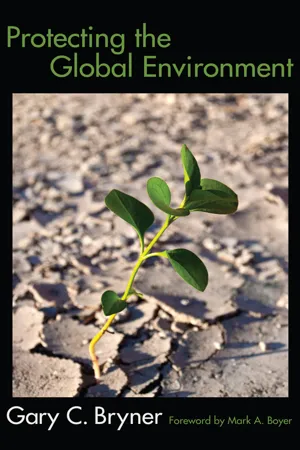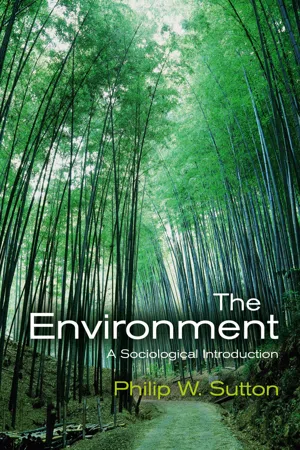Politics & International Relations
Modernist Ecology
Modernist ecology refers to a perspective that emerged in the 20th century, emphasizing the interconnectedness of human societies and the natural environment. It seeks to address environmental challenges through technological and scientific advancements, often advocating for centralized planning and management. Modernist ecology is characterized by a belief in human mastery over nature and the ability to engineer solutions to ecological problems.
Written by Perlego with AI-assistance
Related key terms
9 Key excerpts on "Modernist Ecology"
- Stewart Lockie, David A. Sonnenfeld, Dana R. Fisher(Authors)
- 2013(Publication Date)
- Routledge(Publisher)
A second major contribution of ecological modernization scholarship is to be found in the introduction of a variety of innovative concepts, theoretical notions and major research themes into social theory. They include, amongst others: the notion of emerging processes of ecological rationalization (akin to, but different from, Weber’s idea of institutional rationalization); the notion of political modernization catalysed by civic and institutional environmental response and interaction; the incorporation of market dynamics, market actors and market-based instruments into environmental policymaking and practice. We shortly elaborate on the three innovations in what follows.At the heart of the theory is the understanding of ecological modernization as a process of differentiation – and ‘emancipation’ – of an ecological sphere and the concomitant articulation of an independent ecological rationality (see Dryzek 1987; Mol 1995; Spaargaren and Mol 1992). This conceptual move brings a number of different developments under one common denominator and makes room for the environment in more general social theories.3Another major conceptual innovation is to be found in the introduction of, and the ensuing debate on, the concept of ‘political modernization’ (see Jänicke 1993; Mez and Weidner 1997; van Tatenhove and Pieter 2003; van Tatenhove et al. 2000). Political modernization refers to the renovation and reinvention of state environmental policies and politics in order to make environmental reform better adapted to the new conditions of late-modern societies. The debate on political modernization within environmental politics can be seen as an early formulation of themes and basic ideas of environmental governance. Moreover, the concept of political modernization connected ideas on innovative governance in a direct and explicit way with (the management of) environmental change. The notion of political modernization already included ideas of multiple actors and multi-level governance and made room for various modes of steering and policymaking applied by different actors outside the framework of national environmental governments. As a further specific example of conceptual innovation in this respect, we can refer to the notion of ‘environmental capacity’ as it has been developed within the ecological modernization school of thought by the group around Martin Jänicke in Germany (e.g. Jänicke 1995).- eBook - ePub
Rationality and the Environment
Decision-making in Environmental Politics and Assessment
- Bo Elling(Author)
- 2012(Publication Date)
- Routledge(Publisher)
Incidentally, such a distinction is not easy to sustain. Buttel (2000) stresses that the concept of ecological modernization encompasses an ample range of usages, and identifies four different forms of application: (a) sociological theories of ecological modernization; (b) a portrayal of dominant environmental political discourses; (c) synonymously with environmental management, industrial ecology, eco-reconstruction and so on; and (d) an expression of nearly every innovation in environmental policy or environmental improvement. However, what really matters, according to Buttel, is that the explosive growth in the interest in ecological modernization does not stem from clarity in the theoretical arguments of this line of thinking, but from ecological modernization being an effective answer to a series of circumstances and imperatives in the socio-ecological thinking of the 1990s.In the social sciences, it was seen as necessary to react to the rising influence of radical environmentalist movements, particularly to assess whether radical environmental activism would become a dominant factor of power in society and a necessary forerunner to effective environmental improvements and reforms. Moreover, the concept of sustainable development – which initially seemed so promising to the social sciences – began to manifest its shortcomings regarding the indication of visions for future evolutions and environmental policies. The concept of sustainability was originally developed in a North–South dialogue against the background of experiences concerning primary and renewable sectors in the non-city or rural settings of developing countries. In this context, the concept of ecological modernization provided a platform for new thinking concerning the problems and their solutions, which were mostly related to sectors being transformed in cities in advanced industrial nations. Finally, the advocates of ecological modernization, unlike radical environmentalists, saw the role of environmentalist movements from a fresh perspective by refraining from romanticizing them, and by appreciating the elementary roles that science, technology, capital and the state could play in the processes of environmental innovation. - eBook - ePub
Globalization and the Environment
Capitalism, Ecology and Power
- Pete Newell(Author)
- 2013(Publication Date)
- Polity(Publisher)
Political ecology is predicated on an ecologically conceptualised view of politics: it is attentive to the hard edges of capitalist accumulation and global flows of labour, capital and information, but also attuned to the complex operations of power-knowledge . . . all within a system prone to political-economic crisis (Peet et al. 2011: 23).It is a research agenda that coalesces around the impact of capitalist development on the environment, as well as its emergence through particular socio-natures. It centres both on the social and political implications of prevailing practices of environmental protection and management, and the political economy of the way ‘new natures’ are produced. Such lines of enquiry have been pursued through work on the practices of commodification of ‘neo-liberal natures’ (Castree 2003, 2008; Budds 2004; Mansfield 2004, 2007; Bakker 2005), as well as through ‘classic’ political ecology concerns with questions of access to material and natural resources, and issues of resistance, equity and justice in the negotiation and distribution of social and environmental benefits at multiple scales (Peluso 1992; Bryant and Bailey 1997; Paulson et al. 2003; Zimmerer and Bassett 2003).One strand of political ecology which developed in the wake of, and by way of response to, the Rio Earth summit in 1992 is that associated with the work of Wolfgang Sachs, Nicolas Hildyard, Vandana Shiva and others, which perhaps resonates most directly with the traditional preoccupations of International Relations (IR) scholars (Sachs 1993). Critical of the contents of the Rio agenda, this work provided a powerful and timely antidote to the optimism and faith placed in the institutions of global governance to deliver effective environmental and development outcomes. It drew attention to what went ‘unsaid at UNCED’ in terms of the neglect of the role of militarism, debt and consumption in driving environmental degradation, and the corporate actors that had secured for themselves a place at the negotiating table in deciding appropriate forms of global managerial action, while deflecting attention away from their own implication in accelerating ecological crisis (Chatterjee and Finger 1994; Thomas 1996). It was critical of ‘the aspirations of a rising eco-cracy to manage nature and regulate people worldwide ... largely devoid of any consideration of power relations, cultural authenticity and moral choice’ (Sachs 1993: xv). - eBook - ePub
- Mark Imber, John Vogler(Authors)
- 2005(Publication Date)
- Routledge(Publisher)
fait accompli . The misrecognition of environmental concerns is now remedied through an approach which attempts to bring the environment into international relations. Such an approach is inherently limited, however, because it fails to account for the previous exclusion. Studying the political economy of the environment necessitates an attempt to understand why environmental issues had been hitherto neglected. That is, a past failure to include environmental concerns in the discipline cannot simply be regarded as a fact with no implications for the theorisation of the global system. Accelerated environmental degradation raises crucial questions concerning humanity’s relationship with the natural world, and with other species. Analyses of the global ecological crisis therefore require a rethinking of fundamental concepts and assumptions. Unless international relations theory sets out explicitly to tackle the set of questions which arise from the interaction between the economy and the ecosystem, it will instead merely find itself co-opting environmental analysis and accommodating ‘green’ issues within the prevailing conception of international relations. It is not in fact the case that international relations theory had previously ignored environmental issues altogether, but rather that (like all social sciences) by internalising environmental issues, it had rendered them invisible. International relations theory had traditionally removed from critical view the ways in which, historically, environmental issues had been silenced.The crucial question now becomes: how is the new-found visibility to be articulated? And it is important, indeed, to recognise which approaches will provide the best starting point for assessing the politics and economics of global environmental degradation. Before examining the contribution of IPE, it is necessary to look at the manner in which conventional international-relations theory has approached this task of assessment. - eBook - ePub
- Andrew Dobson(Author)
- 2007(Publication Date)
- Routledge(Publisher)
values underlying them are different. Very broadly speaking, the policy intention of both reformists and radicals is to protect the environment. Radical greens have long argued that this objective cannot be achieved so long as economic growth remains the leitmotiv of industrial and industrializing societies, and so long as our attitude towards environmental protection is guided by anthropocentric lights. The ‘first-wave’ attack on the limits to growth view came from resource cornucopians such as Herman Kahn and Julian Simon who simply argued (and still do) that there is more than enough to go round, more or less for ever: ‘[We]e now have in our hands . . . the technology to feed, clothe, and supply energy to an ever-growing population for the next 7 billion years’ (Simon in Myers and Simon, 1994, p. 65).These arguments continue to be put, but they have been buttressed (or in some cases supplanted) by a much more sophisticated ‘secondwave’ response to the limits to growth position which goes by the name of ‘ecological modernization’ (Jacobs, 1999b; Moll and Sonnenfeld, 2000). In his book on the politics of pollution, Albert Weale describes how ecological modernizers during the 1980s began to challenge the view that there was ‘a zero-sum trade-off between economic prosperity and environmental concern’ (Weale, 1992, p. 31). Ecological modernizers put three arguments: first, ‘[I]f the “costs” of environmental protection are avoided the effect is frequently to save money for present generations at the price of an increased burden for future generations’ (ibid., p. 76); second, ‘[I]nstead of seeing environmental protection as a burden upon the economy the ecological modernist sees it as a potential source for future growth . . . a spur to industrial innovation’ (ibid., p. 78); and third,With the advent of global markets, the standards of product acceptability will be determined by the country with the most stringent pollution control standards. Hence the future development of a postindustrial economy will depend upon its ability to produce high value, high quality products with stringent environmental standards enforced.(Weale, 1992, p. 77)This decoupling of economic growth and environmental degradation has the apparent effect of drawing (at least one of) the principal sting(s) at the disposal of radical ecologists. In strategic terms, why bother with radical ecological ideas if we can, as it were, have our cake and eat it? I shall return to this question below, but first, another approach to the ‘convergence thesis’ needs to be canvassed. Ecological modernizers focus their attention on the economic growth equation, or what we might call the ‘material’ faultline within the pro-environmental caucus. But what about the arguments outlined in Chapter 2 regarding anthropocentrism and biocentrism? Surely it makes a difference to policy whether one adopts an anthropocentric rather than a biocentric stance in respect of environmental protection? - eBook - ePub
- Andrew Dobson(Author)
- 2012(Publication Date)
- Routledge(Publisher)
ConclusionWe have established the differences between ecologism and other major political ideologies, and the incompatibility between what I have called environmentalism and ecologism is now clear. Ecologism seeks radically to call into question a whole series of political, economic and social practices in a way that environmentalism does not. Ecologism envisages a post-industrial future that is quite distinct from that with which we are most generally acquainted. While most post-industrial futures revolve around high-growth, high-technology, expanding services, greater leisure, and satisfaction conceived in material terms, ecologism’s post-industrial society questions growth and technology, and suggests that the Good Life will involve more work and fewer material objects. Fundamentally, ecologism takes seriously the universal condition of the finitude of the planet and asks what kinds of political, economic and social practices are (a) possible and (b) desirable within that framework. Environmentalism, typically, does no such thing.In terms of human relationships with the non-human natural world, ecologism asks that the onus of justification be shifted from those who counsel as little inference as possible with the non-human natural world to those who believe that interference is essentially non-problematic. Environmentalists will usually be concerned about intervention only as far as it might affect human beings; ecologists will argue that the strong anthropocentrism that this betrays is far more a part of our current problems than a solution to them.Practical considerations of limits to growth and ethical concerns about the non-human natural world combine to produce, in ecologism, a political ideology in its own right. We can call it an ideology (in the functional sense) because it has, first, a description of the political and social world – a pair of green spectacles – which helps us to find our way around it. It also has a programme for political change and, crucially, it has a picture of the kind of society that ecologists think we ought to inhabit – loosely described as the ‘sustainable society’. Because the descriptive and prescriptive elements in the political-ecological programme cannot be accommodated within other political ideologies (such as socialism) without substantially changing them, we are surely entitled to set ecologism alongside such ideologies, competing with them in the late twentieth-century political market-place. In contrast, I maintain that the various sorts of environmentalism (conservation, pollution control, waste recycling, etc.) can be slotted with relative ease into more well-known ideological paradigms, and that the way these issues have been readily taken up right across the political spectrum shows this co-option at work. - eBook - ePub
Eco-Socialism
From Deep Ecology to Social Justice
- David Pepper(Author)
- 2002(Publication Date)
- Routledge(Publisher)
For instance they generally reject class politics, seeing social change as consequent on the action of individuals in forming spontaneous, mutualist, non-hierarchical groups to live out their politics (e.g. in communes), and set an example for others to follow. The ‘personal is political’, and ‘person equals planet’ are maxims from more liberal American anarchism (i.e. Roszak 1979) which appear to have great influence. Indeed, the British eco-anarchist’s vision of an ideal society, involving smallscale, collective, decentralised commune-ism, participatory democracy, lowgrowth (or no-growth) economy, non-hierarchical living and consensus decisions and the rest—all this is highly coincident with the American picture presented in Callenbach’s (1978) novel Ecotopia. Eckersley (1992, 145–70) subdivides eco-anarchism (see Table 4.2) into the ‘social ecology’ of Murray Bookchin, ‘bioregionalism’, ‘eco-communalism’ and a more spiritual form of the same, termed ‘monasticism’. In this book I discuss the first two of these more than the last two, which I have dealt with more fully elsewhere (Pepper 1991). 2.4 GREEN POLITICS ARE POSTMODERN POLITICS Postmodernism Many of the issues discussed in Chapter 1.2 were presented as conflicts or choices between opposites, i.e. as dualisms. And it was essentially a discussion of the relative merits of grand theories, attempting to explain societies and social change in terms of universal principles. The same applies to the political economy theories described in Chapter 2.2. This approach—thinking in dualisms, and searching for overarching theory—is all in keeping with a modernist perspective. ‘Modernism’ is a word describing the tenor of much Western thought over three hundred years, originating in philosophers like Descartes, Locke and Kant, and believing in reason, science and progress: what Habermas (1983, 9) calls the project of modernity came into focus during the eighteenth century - eBook - ePub
- Gary C Bryner(Author)
- 2015(Publication Date)
- Routledge(Publisher)
NDERSTANDING GLOBAL ENVIRONMENTAL POLITICS Theories of International Relations and Political ScienceT here is broad and deep agreement among environmental scientists that climate change, water shortages, and loss of biodiversity combine with other global environmental problems to threaten the future of humankind. They point out that droughts and other extreme weather events, declining fisheries, emerging diseases, and inadequate food production are some of the results of these crises. The evidence of environmental harms is clear, and there is widespread consensus among ecologists that risks are increasing. Yet that scientific knowledge has not resulted in thorough policy responses. This chapter examines the political and behavioral factors that have kept us from developing effective responses to global environmental threats. This means asking why we have been so unwilling to address threats to our well-being, especially as taking timely action seems so clearly in our self-interest.One way to think about these challenges is to lay them out on a continuum. At one end are environmental consequences that can be managed under existing institutions of government; the task at this end is to continue with existing efforts and expand these efforts incrementally to meet new problems. International relations (IR) theories are best suited to address these kinds of consequences, but unfortunately, there is little agreement that consequences will be so limited. At the midpoint in the continuum are consequences that require major changes in the policy-making capacity. These involve creating the ability to bring about needed changes in the way people in the wealthy world consume resources and to foster a type of development in poor countries that dramatically increases their peoples’ well-being without also increasing their environmental impacts. At the other end of the continuum, environmental changes are likely to be chaotic, unpredictable, and catastrophic. IR theory is not well suited to suggesting how far-reaching changes in policy capacity can be fostered, and it has few resources for understanding human behavior in the face of catastrophic environmental change. - eBook - ePub
The Environment
A Sociological Introduction
- Philip W. Sutton(Author)
- 2013(Publication Date)
- Polity(Publisher)
ism. Political ideologies always present a diagnosis of society’s current problems, a set of solutions to those problems and a strategy for getting from here to there. Ecologism does exactly this in relation to the society–nature relationship and the solving of environmental problems. So, ecologism says that there is a looming environmental crisis that needs to be solved and that doing so will need some quite radical changes to the social structuring of life. Greens of course have ideas on how this restructuring could be achieved. The emergence of such a ‘political ecology’ reflects the fact that the natural environment has become politicized to a much greater degree than in previous decades.Ulrich Beck has made the point that environmental issues have become increasingly significant because nature has emerged as a political issue as awareness has grown that the hard and firm distinction between nature and society is being eroded. It is not that there is no real nature any more, but just that those things we previously thought of as ‘natural’ and therefore outside of human society are now coming to be seen as part of society itself. Take the genetic modification (GM) of crops. Scientists are now able to manipulate the genetic structure of natural species to make them more productive or resistant to disease. After being manipulated by people, are such crops and foods still a part of nature, or not? Certainly, environmental campaigns in Europe have targeted and destroyed GM crops as being ‘unnatural’ things that threaten to interfere with nearby ‘natural’ organic crops. But perhaps the right answer is that they are a bit of both. GM crops are part natural and part social. Anthony Giddens puts this a different way. He argues: ‘Nature has become socialized. Today, among all the other endings, we may speak in a real sense of the end of nature – a way of referring to its thoroughgoing socialization’ (1994: 77). The dividing line between the ‘natural’ and the ‘social’ has become increasingly blurred. The environmentalist writer Bill McKibben makes a similar point. He says that the effects of industrial production are now so strong that ‘[a] child born now will never know a natural summer, a natural autumn, winter or spring. Summer is going extinct, replaced by something else that will be called “summer”’ (1990: 55). What he means by this is that the timing of the seasons is changing, as are the weather patterns that characterize them. Human societies are changing the cycles and processes of nature but, and this is an important point, they are not exerting control over them. These changes are unplanned, uncontrolled and for many people actually quite unsettling. Environmental issues are therefore one important source of that emerging ‘risk society’ that Beck identified in the late 1980s (chapter 5
Index pages curate the most relevant extracts from our library of academic textbooks. They’ve been created using an in-house natural language model (NLM), each adding context and meaning to key research topics.
